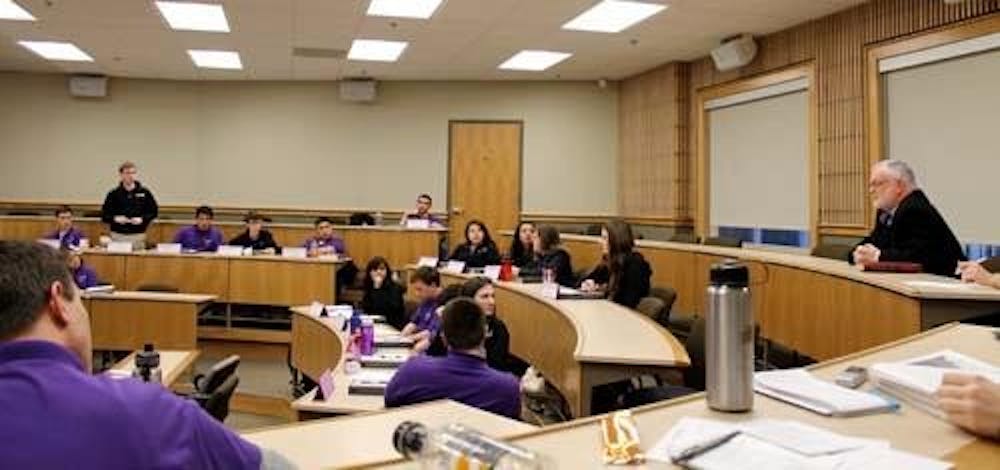ASUP resolution opposing changes to Theology 101 is vetoed and sent back to the drawing board
Interim provost Tom Greene, right, takes questions from ASUP senators about UP’s Theology 101. (Giovanna Solano | THE BEACON)
The ASUP Senate postponed overriding a rare veto by the ASUP president on a resolution protesting changes to the theology curriculum.
Last month, ASUP drafted Resolution 12-11 opposing the proposal to change the curriculum of Theology 101 after hearing dissent among UP students.
ASUP President Brock Vasconcellos vetoed the resolution because it was written without seeing the actual proposal from the theology department. Vasconcellos, a senior, also requested the resolution be supported with data measuring student discontent about the proposed changes to Theology 101 as well as rewording the resolution to make it stronger.
"Once revised, [Resolution 12-11] has the potential to go a little bit further than right now," Vasconcellos said. "Really it just comes down to quality. If I'm going to present something to people whose job it is to interpret the University's mission and administer the direction of the University, we need to have all our cards ready to play."
Presidential vetoes are rare in ASUP Senate, occurring approximately once every three years, according to Jeromy Koffler, director of student activities.
"I think Brock used [the veto] well," Koffler said. "He definitely opened some eyes who may have unanimously voted for [the resolution] because they were in agreement with the concept and didn't really look at the writing carefully, or if they did, didn't see how someone might counter argue and poke holes in it."
Proposition against change
All students are required to take Theology 101. Last semester, when The Beacon reported the elimination of world religions from the class curriculum, Will Deming, chair of the theology department said President Fr. Bill Beauchamp had asked the College of Arts and Sciences to consider the change. Beauchamp could not be reached for comment.
When ASUP senator Adam Harnden first heard about plans to narrow the focus of Theology 101, he wanted to write a resolution opposing the change
"I feel getting a well - rounded idea of what world religions are is a very good thing," Harnden said. "I know I really enjoyed the class and I feel like future generations should be allowed to experience that as well and get that broad range of different religions and cultures."
Harnden, along with senators Brooke Murphy and Dorcas Kaweesa, drafted Resolution 12-11. ASUP hopes to present the resolution to the Academic Senate in February, according to Harnden.
Theology professor and Associate Provost Matthew Baasten, who is overseeing the changes to the theology curriculum, will announce the changes at the ASUP senate meeting Monday. When The Beacon contacted Baasten last week, he said the curriculum was not ready to be discussed.
"Good rationale"
At the ASUP senate meeting Jan. 20, interim Provost Thomas Greene said the changes to Theology 101 came after a review of the theology curriculum two years ago. Reviews of department curriculum take place on a seven to ten year cycle.
While Greene doesn't know details of the curriculum, he said the changes being made regard the sequencing of theology classes. While a study of world religions is not to be the focus of freshmen and sophomore theology, it will be integrated into the curriculum. A a third year of theology will provide more opportunities to study religions of other cultures, according to Greene.
"I don't want you to think that somehow the theology department or your president thinks that the study of other religions is not important. It is important and we recognize that," Greene said. "But I hope you will have the patience to wait and review the syllabi before you come to a judgment that this place has gone provincial and suddenly isn't interested in the rest of the world. There's good rationale behind [the changes]."
ASUP postponed discussion of the resolution until Jan. 28.
Voice of the students
While the resolution does not directly affect the theology department's ability to change the curriculum, it brings the voice of the students to the administration.
Harnden hopes the senate's work will pay off.
"I hope they see that we as students are taking this issue seriously," Harnden said. "Right now we're gathering all the information, everything we can to prove our point, doing everything we can for it."
As ASUP adviser, Koffler supports the students' effort to make their voices heard.
"I believe in it, the power of student government, and it should be a productive one so they can work with the administration and faculty to improve the quality of life at UP whether that be inside the classroom or outside the classroom." Koffler said.








